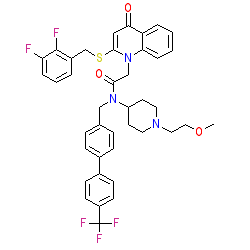|
Synonyms: SB 659032
Compound class:
Synthetic organic
Comment: Lipoprotein-associated phospholipase A2 (Lp-PLA2, PLA2-G7) inhibitors such as rilapladib and darapladib have been evaluated in clinical trials: darapladib for coronary heart disease, and rilapladib for Alzheimer's disease. Compounds of different chemotypes are being explored as tools to further optimise the pharmacological modulation of PLA2-G7 as a target for clinical intervention- see also (S)-23 [PMID: 27933945] (tool compound).
Ligand Activity Visualisation ChartsThese are box plot that provide a unique visualisation, summarising all the activity data for a ligand taken from ChEMBL and GtoPdb across multiple targets and species. Click on a plot to see the median, interquartile range, low and high data points. A value of zero indicates that no data are available. A separate chart is created for each target, and where possible the algorithm tries to merge ChEMBL and GtoPdb targets by matching them on name and UniProt accession, for each available species. However, please note that inconsistency in naming of targets may lead to data for the same target being reported across multiple charts. ✖ |
|
|||||||||||||||||||||||||||||||||||
| No information available. |
Summary of Clinical Use  |
| The potential for this compound to treat Alzheimer's disease has been assessed in a Phase 2a study (NCT01428453). |
Mechanism Of Action and Pharmacodynamic Effects  |
| Lp-PLA2 is a circulating enzyme secreted by monocytes and generates proinflammatory and oxidative mediators such as lysophosphatidylcholine and oxidized fatty acids, which promote development of atherosclerotic lesions. Lp-PLA2 is considered a risk factor for cardiovascular disease and vascular inflammation. Dysregulated lipid metabolism has been implicated in stroke and dementia. Some research suggests that Lp-PLA2 may be a risk for dementia [2], but this is not the conclusion of a different study which does not find this disease association [1]. |








